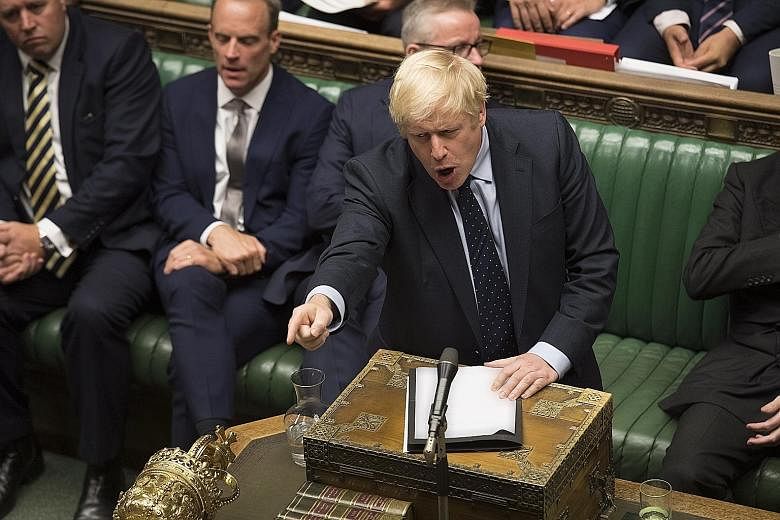LONDON • The showdown between British Prime Minister Boris Johnson and Parliament continued yesterday, with lawmakers set to vote on the attempt to block a no-deal Brexit and on Mr Johnson's election bid.
The Prime Minister yesterday demanded an Oct 15 snap election after lawmakers seeking to prevent a no-deal Brexit dealt him a humiliating defeat in Parliament, which he cast as an attempt to surrender to the European Union (EU).
Parliament's move leaves Brexit up in the air, with possible outcomes ranging from a turbulent no-deal exit to abandoning the whole endeavour. Both outcomes would be unacceptable to Britain's voters.
Mr Johnson has pledged never to delay Brexit beyond Oct 31, and has challenged opposition Labour Party leader Jeremy Corbyn to agree to an Oct 15 election.
"Can I invite the leader of the opposition to confirm, when he stands up shortly, that if that surrender Bill is passed, he will allow the people of this country to have their view on what he is proposing to hand over in their name with an election on October the 15th," Mr Johnson told Parliament yesterday.
However, needing the backing of two-thirds of lawmakers, his bid for a general election is set to be initially thwarted.
The Labour Party said it would not back the vote to hold an election and would ideally like to pass legislation that seeks to prevent a no-deal Brexit, by delaying Britain's departure from the EU to Jan 31, before backing new parliamentary polls.
Labour's finance policy chief John McDonnell told reporters that the party wanted legislation to get royal assent, adding that "we are also not going to be tricked or conned by Johnson, so we are looking at every way in which, having secured the legislation, he can't wriggle out of abiding by the law and implementing it".
Opposition parties and rebels in Mr Johnson's own party have said they would not allow a no-deal Brexit to be "smuggled" through under the cover of an election.
Mr Johnson said his strategy was to get a Brexit deal sorted by an EU summit on Oct 17, and "get Brexit done". He said the British government was making substantial progress and would succeed in removing the Irish border backstop.
However, Ireland's Foreign Minister Simon Coveney said Britain had not yet presented any solutions to solve the Brexit impasse.
The government had pencilled in an election for Oct 15 should Parliament vote yesterday to delay Brexit. As the three-year Brexit crisis approaches a crescendo, Britain was edging towards an election as most British politicians see no other way to break the impasse.
One scenario is for opposition parties to defeat Mr Johnson's bid for a general election until they have passed their Bill blocking a no-deal Brexit. Once in law, opposition parties could then agree to an election.
An election next month would open up three likely options: A Brexit-supporting government under Mr Johnson, a Labour government led by Mr Corbyn or a hung Parliament that could lead to a coalition or minority government of some kind. The type of Brexit that emerges from that election is unclear, though there would be little time for a deal before the Oct 31 deadline. A pro-Brexit government could overturn any laws aimed at preventing a no-deal Brexit.
In a piece of good news for Mr Johnson, a Scottish court ruled yesterday that his decision to suspend Parliament next week was lawful.
Signalling the government's determination, Finance Minister Sajid Javid said yesterday he was "turning the page on austerity" as he promised the biggest spending increases in 15 years - a move widely seen as part of Mr Johnson's push for an election to break the impasse.
Mr Javid unveiled another £2 billion (S$3.37 billion) in funding to deal with Brexit and also promised more money for "the people's priorities", including education, health and the police. There would also be an "infrastructure revolution" with more funding for the armed forces and social care, and no cuts for any government department next year.












